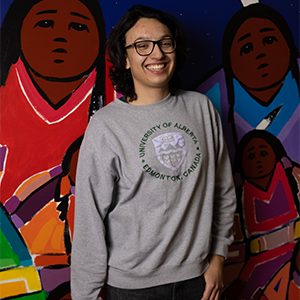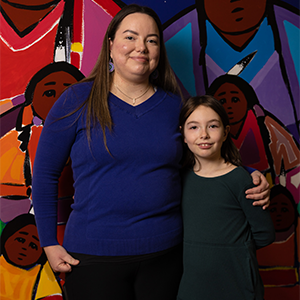How to Apply to the Transition Year Program
Application Deadlines
- September start
- Applications accepted November 1 - May 1.
- January start (Arts and Native Studies routes only)
- Applications accepted August 1 - October 1.
Step 1: Understand admission requirements
Make sure you understand and will potentially meet the admission requirements for the program route you are applying for. English 30-1 or equivalent is required for all program routes. More information on admission requirements is available here.
Step 2: Understand the requirements of the application
There are four types of documents you will need to submit with your application:
The letter of intent should be about 1-2 pages (250-500 words) that helps us get to know you a bit better. It is helpful if you can share a bit about where you grew up, what experiences have influenced your decision to pursue post-secondary education, any challenges you have faced or achievements you have made along the way.
Please also share what you hope to gain from being a part of the Transition Year Program, and a bit about your academic or professional goals. You can also include any extracurricular activities you are involved with or volunteer work you have done. Providing information about your past and current education is helpful, as well as including any courses you plan to take in the coming months.
Prompt Questions:
- Who are you and where are you from?
- What are the most significant aspects of your educational or work experiences?
- Have you had any challenges or barriers to overcome on your journey? How has that impacted your educational and/or career goals?
- Why do you want to attend university, this program (TYP), or why have chosen this particular faculty route?
- What would contribute to our campus community?
Please provide an accurate and up-to-date record of ALL of your previous education history and a verification of any courses you are currently taking or plan to take to be considered for admission. High school records can be unofficial and provided by your school. Post-secondary transcripts can be unofficial or in progress but must be provided even if no transferable credits were completed.
First Nations, Métis and Inuit applicants who wish to be considered for admission to the Transition Year Program are required to provide verification of First Nation, Métis or Inuit documentation in accordance with the Constitution Act, 1982, Part II, Section 35(2). The following is accepted documentation for the purpose of application to TYP:
- a certified copy* of a Status card from the Government of Canada;
- a certified copy* of a Métis membership card from one of the five Métis Provincial Affiliates or recognized Territorial organizations; Métis Nation of Alberta, Métis Nation of Ontario, Manitoba Métis Federation, Métis Nation Saskatchewan, Métis Nation British Columbia, Northwest Territory Métis Nation. Additionally, the student may present a membership card from the Métis Settlements General Council showing membership in a Métis Settlement of Alberta;
- a certified copy* of a Nunavut Trust Certificate card;
- documentation that an ancestor’s name has been entered 1) in the Indian Register according to the Indian Act, or 2) on the band list of an individual band, or 3) as beneficiaries of the Nunavut Land Claims Agreement or other claim regions such as Nunatsiavut, Nunavik, and Inuvialuit;
- written confirmation of Indigenous identity from Indigenous and Northern Affairs Canada or Nunavut Tunngavik Incorporated;
- written confirmation of membership by a band council which has enacted its own band membership code
The University of Alberta recognizes that Indigeneity and connecting to your Indigenous identity can be a complex process. We work closely with the University of Alberta Committee on the Documentation of Indigeneity to review documentation that is not listed above.
*Certified copy references that the documents will be from a certified organization. Documentation does not need to be notarized to be submitted.
All documents must be submitted as readable scans/photocopies of documents in PDF format. All documents must also follow the specified file naming system as outlined in the TYP Application Checklist.
Step 3: Prepare
- Start the process early. Speak with potential references about preparing their letters of support, and work on the personal information that is required.
- Go through the checklist and ensure you complete all of the items.
- Once you have gathered all necessary documents and information, assemble the information in one place electronically.
Step 4: Submit
- Set aside 15 - 20 minutes to fill out the online application. Once you begin the online application, you will not be able to save and return to your application later.
- Access the online application form and submit. If you chose to email, mail, fax, or submit in person any of your documents, your application will remain incomplete until you do so.
- Make sure you understand the minimum course and grade requirements before you apply (link to program requirements sheet here). If you are unsure if you have the needed entrance requirements, contact the Associate Director in advance of the admission deadline.
- Submit a complete application package before the application deadline either online or by submitting a paper application. You will be assessed based on the information provided by the application deadline, and will not be permitted to submit additional documentation after the application deadline.
- Please submit all online documents in PDF format if possible to ensure they are readable when received.
- If you have an application pending for direct entry to a
faculty but are not sure if you will be admissible, you should also submit a complete application package to TYP. - Do not assume the minimum entrance requirements will ensure admission to TYP. You are encouraged to prepare as much as possible for success in university by presenting your best effort in all required courses.
- Once your application is submitted, you are required to notify the Associate Director regarding any changes to your course enrolment or contact information as soon as possible as it may impact your admissibility.
Student Testimonials

Teigan Harvey
BA in English

Jaycee Russell
Bachelor of Arts
"I really enjoyed my time in the TYP program. I gained meaningful connections with both fellow students and the administration. I have gained the skill and feel confident navigating available resources, the campus, and the websites. I recommend the TYP program to anyone of my peers that are looking for a positive university experience."